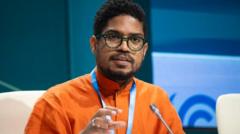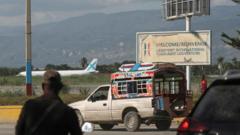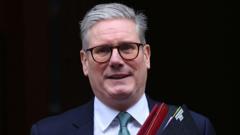At the COP29 climate talks in Baku, Azerbaijan, the Alliance of Small Island States (AOSIS) made a dramatic walkout, pushing the negotiations close to collapse. Michai Robertson, AOSIS’s finance negotiator, revealed that the group was prepared to leave the summit entirely, feeling that other countries were dismissive of their urgent climate change concerns.
AOSIS represents 39 countries and territories, including Samoa, Barbados, and Trinidad, which are extremely vulnerable to climate change’s impacts. Their primary goals at UN climate summits are securing more financial support to address challenges like eroding coastlines and devastating weather events, and pushing for stronger action to reduce fossil fuel emissions.
The walkout occurred after 19 hours of overrun negotiations, with AOSIS accompanied by the Least Developing Countries group. Robertson described the moment as spontaneous, triggered when Evans Njewa, the chair of the Least Developed Group, expressed frustration and stood up, prompting the entire group to exit the meeting room.
Robertson emphasized that this was unprecedented, marking the first time in 29 years of UN climate talks that AOSIS had taken such a step. He stressed their motto “1.5 to stay alive,” referring to the critical goal of keeping global temperature rise within 1.5°C above pre-industrial levels. Current UN projections suggest the world is heading towards 3.1°C of warming, which AOSIS considers a “death sentence” for island nations.
The walkout quickly garnered attention, with the COP presidency, developed countries, and other blocs immediately reaching out. Robertson noted that it was “sad” that it took such a dramatic action to be heard.
Ultimately, AOSIS returned to the negotiating table, and a deal was reached in the early hours of Sunday morning. The agreement included:
– A commitment from developed nations to provide $300 billion annually until 2035 for developing countries
– An acknowledgment that $1.3 trillion is needed from public and private sources
– However, the deal fell short of AOSIS’s requested $500 billion in public finances
Robertson described the final outcome as “acquiescence,” admitting the $300 billion goal was insufficient. Nevertheless, he viewed the walkout as a significant moment, stating, “The best thing that came out of this is that they know we are a force to be reckoned with.”
He also suggested that future talks, including COP30 in Brazil, must “put aside petty geopolitics” and noted that the election of US President Donald Trump had potentially weakened the final deal.
Despite the challenges, Robertson maintained that the COP process remains crucial for small island nations, as it is the only global forum where their voice truly matters, even if they sometimes feel “held hostage by the process.”




